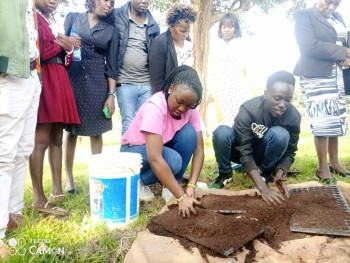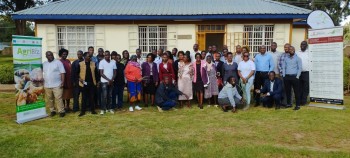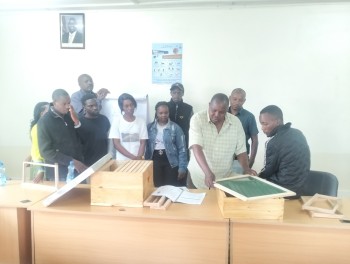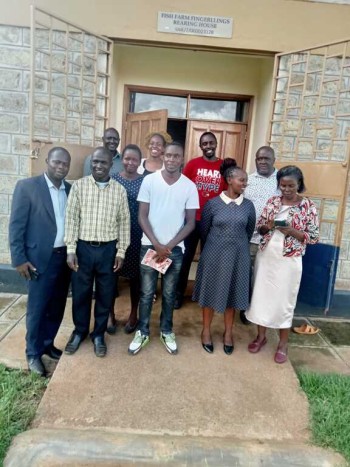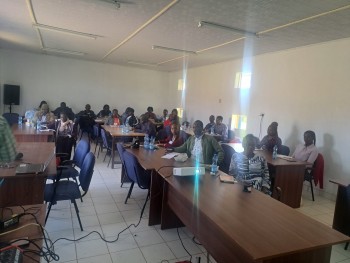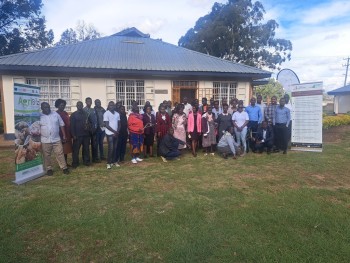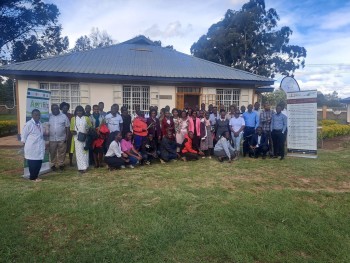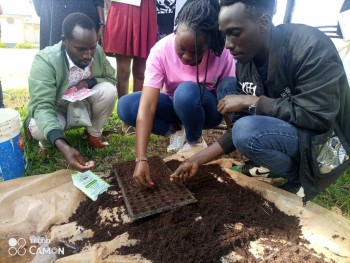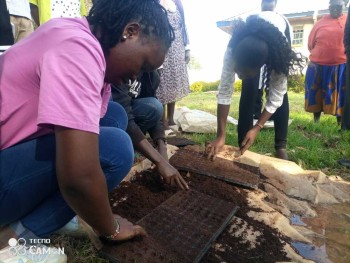The Outreach and International Students’ Centre (OISC) in collaboration with Kenya Climate Innovation Centre (KCIC) held a one-week technical training as part of the MoU implementation. It was conducted under the KCIC’s ‘Vijana na Agribiz’ project. A total of seventy-five (75) Incubatees attended the training which was held at the OISC from Monday, 22nd to Friday, 26th April 2024 and it focused on three value chains; Horticulture Production, Apiculture and Aquaculture.
A. Horticultural Production
This training attracted fifty-four (54) Incubatees, most being accelerators who are already practicing horticultural production. It was conducted by Dr. Daniel Chebet, Dr. Victoria Anjichi and Dr. Josiah Chiveu, all from the Seed, Crop and Horticultural Science Department, School of Agriculture. The Incubatees were exposed to both theory and practical lessons. The practical lessons were assisted by 3rd and 4th year BSc Horticulture students.
The Incubatees were exposed to the types of horticultural crops ranging from leafy, fruit, stem and root vegetables, major and minor fruits, ornamental horticulture, herbs, spices and medicinal plants. The second topic of the day was on principles of success in horticulture farming. They were taken through principles and practices of plant propagation and nursery practices. The topics covered included nursery establishment and management, nursery structures, planting media, nursery business and practices of plant propagation. They were taken through practical demonstration on vegetable seedling propagation. Other areas included principles and practices of vegetable and herbs production and marketing which included selection of planting sites, planting/transplanting, intercropping and cover cropping and mulching, crop rotation, irrigation and pest and disease control.
On the third day, the Incubatees were taken through the principles and practices of fruit production. They were exposed to topics on pruning and training, mineral nutrition and fertilizers where focus was made on the types of fertilizers, the timing of fertilizer application, fertilizer placement and deficiency and toxicity symptoms. The Incubatees were also taken through climate smart agriculture technologies including use of raised beds, sunken beds, container planting, vertical gardens, multistory gardens, mandala gardens, keyhole gardens, oasis gardens and hugelculture. They were also taken through irrigation methods, rainwater harvesting and storage and soil and water conservation practices. On the last day, the Incubatees were taken to a farm visit to a seedlings production farm in Illula owned by a former University of Eldoret Diploma in Agriculture student. Overall, the training was enriching and impactful, and the students learned a lot.
B. Apiculture
The apiculture training had eleven (11) Incubatees and was led Dr. Emmanuel Ayua, from the Family and Consumer Science Department and Mr. Bernard Njoroge, a former KCIC incubatee and a practicing bee keeping farmer in Ilula.
The training covered the importance of apiculture and bee keeping including cultural purposes such as use of honey in importance occasions such as weddings and payment of dowry. Other important functions of bee keeping included source of medicine, income, used for pollination, as food and apitherapy.
The Honey bee caste system, this focused on the life cycle and functions of members (drone, worker bee, queen) of the colony. The Management of honey bee/apiaries: types of bee hives with their advantages and disadvantages, catching a swarm, feeding bees, pests and disease management, hive inspection steps, bee harvesting gear, reasons for bees absconding hives.
In addition to honey processing and by products of honey: honey/wax/royal jelly/propolis processing equipment. This included honey pressing, centrifugal honey extractor, honey filtration and packaging, wax extraction using solar melter and hot water bath method extraction, by products of wax, how to trap pollen and its uses by the colony.
The training also included the quality tests done on honey: Flame test: Put a matchstick in the honey and if the water content is too high then the head will be damp and will not burn; Drop a droplet of honey on dry soil. If the honey spreads into the soil and disperses then the water content is too high. The honey should sit on the soil as a globule; Fermentation test: When honey ferments, it produces a smell that many people do not like and develops a sour flavor; blot tests: If the honey flows through the blot paper without wetting it, then it is considered as pure whereas if the honey gets absorbed or wets the blotting paper, then it is considered as impure honey; and solubility tests: In this test, the honey is made to dissolve in a glass of water slowly. If your honey reaches the bottom of the glass without dissolving in the water then it is said that the honey is pure. However, this test can give you false results as the adulterants (except molasses) used in honey make its consistency thick, so that it does not dissolve in water. Other tests included brix tests to tests sugar, color measurement using hunter colorimeter and free fatty acids. Various sections of a honey processing facility including reception, processing, packaging, storage and quality control areas.
The Practical sessions covered the demonstrations of how to use a refractometer to tests for brix, use of hunter colorimeter to test for color of honey. Honey processing practical included demonstration of how to use honey extraction techniques using a centrifugal honey extractor and pressing methods, honey filtration, packaging, bee wax extraction, and a visit to the University farm to see apiaries.
C. Aquaculture
The aquaculture training had ten Incubatees and was led by Dr. Josiah Ani and Dr. David Lusega, both from the Aquaculture and Fisheries Department. The training focused on viewing aquaculture as an income generation activity rather than a hobby, training the following areas were tackled.
The design and construction of fish rearing units. The Incubatees were able to design different units, include harvesting basins to ease fish harvesting and Installation of liners and drainage systems in liner-based ponds, they also covered Fish nutrition, they were able to learn the nutritional requirements of tilapia, catfish and ornamental fishes.
The management of fish rearing units, how to effectively control predators and aquatic weeds and the Integrating fish-plants-animals farming. The pro and cons of such systems and how to get the best out of it. The greenhouse aquaculture was covered in details, the management of brooders, fry and fingerlings for commercial purposes, Fish health management, the innovations in aquaculture for small scale fish farmers.
In addition to the Fish feed formulation, storage and administration; Challenges facing small scale fish farmers in Kenya. The Incubatees were able to mention the challenges they face in their own enterprises. Each challenge was discussed jointly and solutions suggested. Lastly, the training dealt with the Market dynamics in a digital world, the management, breeding and selection of ornamental fishes and the record keeping in aquaculture.
The incubates were also taken through practical sessions like live fish handling procedures, pelletization of feeds, Sexing of fish, identification of fish feed ingredients and the use of feed formulation softwares to improve the management of the fish.

